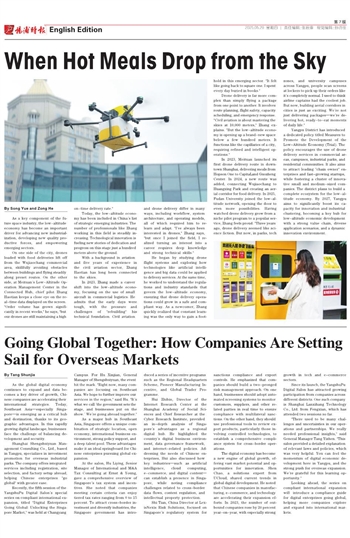By Tang Shunjia
As the global digital economy continues to expand and data becomes a key driver of growth, Chinese companies are accelerating their international strategies. Today, Southeast Asia—especially Singapore—is emerging as a critical hub and destination, thanks to its geographic advantages. In this rapidly growing digital landscape, businesses face the challenge of balancing development and security.
Shanghai Shengshuiyuan Management Consulting Co., Ltd., based in Yangpu, specializes in investment promotion for overseas industrial parks. The company offers integrated services including registration, site selection, and factory setup abroad, helping Chinese enterprises "go global" with greater ease.
Recently, the fifth session of the YangshuPu Digital Salon's special series on compliant international expansion, titled "Digital Enterprises Going Global: Unlocking the Singapore Market," was held at Changyang Campus. For Hu Xinjian, General Manager of Shengshuiyuan, the event hit the mark. "Right now, many companies are focusing on Southeast Asia. We hope to further improve our services in the region," said Hu. "It's what we call 'the government sets the stage, and businesses put on the show.' We're going abroad together."
As a major hub in Southeast Asia, Singapore offers a unique combination of strategic location, open economy, international business environment, strong policy support, and a deep talent pool. These advantages make it an ideal springboard for Chinese enterprises pursuing global expansion.
At the salon, Hu Liying, Senior Manager of International and M&A Tax Consulting at Ernst & Young, gave a comprehensive overview of Singapore's tax system and incentives. She noted that companies meeting certain criteria can enjoy tiered tax rates ranging from 0 to 15 percent. To attract cross-border investment and diversify industries, the Singapore government has introduced a series of incentive programs such as the Regional Headquarters Scheme, Pioneer Manufacturing Incentive, and Global Trader Programme.
Hui Zhibin, Director of the Internet Research Center at the Shanghai Academy of Social Sciences and Chief Researcher at the Cyber Research Institute, provided an in-depth analysis of Singapore's advantages as a regional digital hub. He highlighted the country's digital business environment, data governance framework, and internet-related policies. Addressing the needs of Chinese enterprises, Hui also discussed how key industries—such as artificial intelligence, cloud computing, e-commerce, and digital content—can establish a presence in Singapore, while noting compliance challenges related to cross-border data flows, content regulation, and intellectual property protection.
Shi Tian, China Director at LexisNexis Risk Solutions, focused on Singapore's regulatory system for sanctions compliance and export controls. He emphasized that companies should build a two-pronged risk management approach. On one hand, businesses should adopt automated screening systems to monitor customers, suppliers, and other related parties in real time to ensure compliance with multilateral sanctions. On the other hand, they should use professional tools to review export products, particularly those involving controlled technologies, to establish a comprehensive compliance system for cross-border operations.
The digital economy has become a new engine of global growth, offering vast market potential and opportunities for innovation. Shen Chao, a solutions expert from UCloud, shared current trends in global digital development. He noted that Chinese companies in manufacturing, e-commerce, and technology are accelerating their expansion efforts. In 2023, the number of outbound companies rose by 20 percent year-on-year, with especially strong growth in tech and e-commerce sectors.
Since its launch, the YangshuPu Digital Salon has attracted growing participation from companies across different districts. One such company is Shanghai Lanxihang Technology Co., Ltd. from Fengxian, which has attended two sessions so far.
"There used to be many challenges and uncertainties in our operations and partnerships. We really needed professional insights," said General Manager Tang Yizhen. "This salon provided a detailed explanation of relevant laws and policies, which was very helpful. You can feel the momentum of digital economic development here in Yangpu, and the strong push for overseas expansion. We're grateful for this learning opportunity."
Looking ahead, the series on compliant international expansion will introduce a compliance guide for digital enterprises going global, helping more companies explore and expand into international markets.

